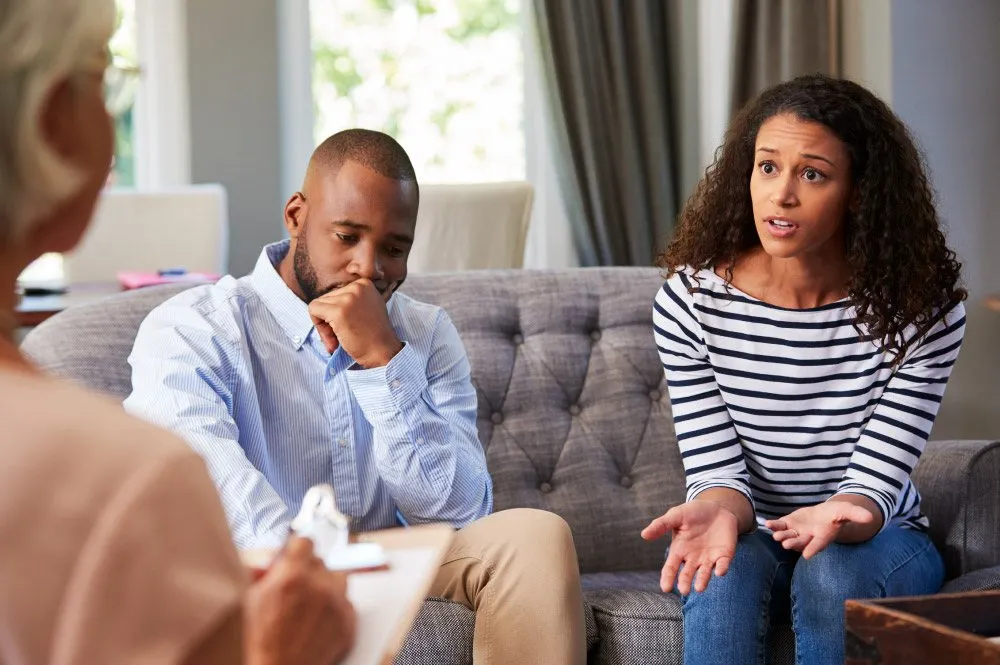When the picture-perfect world of love and togetherness starts to blur, the bond of marriage may begin to feel like a daunting maze. You might find yourself at a crossroads, where neither separation nor staying together appears clear. Is there a path to help us unravel these tangled threads? Enter Divorce Discernment Counseling – a unique approach that offers valuable space for couples on the verge of separation. So let us deep dive dn find out how divorce counseling can help you make an informed decision.
Contents
- 1 What is Divorce Discernment Counseling?
- 2 The Aim of Divorce Discernment Counseling
- 3 The Process of Divorce Discernment Counseling
- 4 Benefits of Divorce Discernment Counseling
- 5 Limitations of Divorce Discernment Counseling
- 6 Is Discernment Therapy Worth It?
- 7 How Divorce Discernment Counseling Differs from Traditional Couple Counseling?
- 8 Conclusion
What is Divorce Discernment Counseling?
 Divorce Discernment Counseling is a unique type of counseling made specifically for couples who are thinking about divorce. But unlike traditional marriage counseling which aims to resolve problems and keep the couple together, Discernment Counseling focuses on helping the couple understand their relationship better. It helps them figure out whether they should try to restore their marriage, move towards divorce, or keep things as they are for now.
Divorce Discernment Counseling is a unique type of counseling made specifically for couples who are thinking about divorce. But unlike traditional marriage counseling which aims to resolve problems and keep the couple together, Discernment Counseling focuses on helping the couple understand their relationship better. It helps them figure out whether they should try to restore their marriage, move towards divorce, or keep things as they are for now.
In simple terms, it’s like a pause button that allows both partners to step back, think clearly about their relationship, and make sure they are making the right choice about their future together or apart.
The Aim of Divorce Discernment Counseling
What does Divorce Discernment Counseling aim to do? Simply put, it aims to give couples the clarity they need during a confusing time. It doesn’t try to fix the relationship or push the couple toward a specific outcome. Instead, it provides a structured environment where both partners can express their thoughts and feelings, gain a better understanding of what’s going wrong in their relationship, and explore all potential options.
The end goal? To empower the couple to make an informed decision about their future. Whether they choose to repair their relationship, part ways, or remain in the current state for a little longer, they will be able to do so with confidence and peace of mind, knowing they have thoroughly explored their choices.
The Process of Divorce Discernment Counseling
 Understanding the process of Divorce Discernment Counseling can help demystify what you might expect if you choose to take this route. It’s not a long, drawn-out journey; rather, it’s a focused, step-by-step path divided into three primary parts.
Understanding the process of Divorce Discernment Counseling can help demystify what you might expect if you choose to take this route. It’s not a long, drawn-out journey; rather, it’s a focused, step-by-step path divided into three primary parts.
- Initial Session
This is the first step on the journey, where you and your partner meet with the counselor together. During the initial sessions, your counselor may ask a variety of questions to better understand your relationship and the challenges you’re facing. Here are some common ones:- What are the main issues you’re currently facing in your relationship?
- What have you tried so far to resolve these issues?
- What do you believe has contributed to these problems?
- Can you recall a time when things were better between you? What was different then?
- What are your hopes and fears about the future of your relationship?
- Have you considered divorce before now? If so, what made you reconsider?
- Are there any immediate concerns (like children, financial issues, etc.) that worry you about the prospect of divorce?
- How do you see your relationship affecting your well-being and happiness?
- What are your personal needs that you feel are not being met in this relationship?
- How do you believe your partner sees the problems in your relationship?
- Individual Sessions
Following the initial meeting, you’ll each have individual sessions with the counselor. This is a safe, private space where you can voice your concerns, fears, and hopes without any judgment or interruption. The counselor will listen and help you explore your feelings in depth.
- Joint Sessions
After the individual sessions, you’ll come back together for joint sessions. With the help of the counselor, you’ll share your insights from your personal sessions, fostering honest communication. The counselor will help facilitate these discussions, encouraging mutual understanding and respect.
Remember, the process’s goal is not to solve all your relationship problems, but to give you clarity and confidence in whatever decision you make about your relationship’s future.
Benefits of Divorce Discernment Counseling
The benefits of these counseling sessions go beyond merely providing a platform to voice your concerns. Let’s delve into these advantages.
- Clarity in Decision-making
The primary benefit of this counseling is the clarity it provides. It illuminates the possible paths you can take, helping you make a well-informed decision about your future. Whether you choose to stay together, part ways, or take more time to decide, you’ll move forward with confidence.
- Improved Communication
One of the many gifts of Discernment Counseling is the improvement in communication between partners. The sessions foster an environment of honesty and openness, which can help you both understand each other’s perspectives better.
- Personal Growth
Undergoing this process is not only beneficial for your relationship, but it can also lead to significant personal growth. It allows you to explore your feelings and learn more about your desires and needs, leading to a better understanding of yourself.
These benefits combined can provide valuable insights and understanding, whether you decide to save your marriage or part ways. It ensures that you’re not rushing into a decision that you might regret later.
Limitations of Divorce Discernment Counseling
 While Discernment Counseling has many benefits, it’s important to also understand its limitations. Here are a few key points to consider:
While Discernment Counseling has many benefits, it’s important to also understand its limitations. Here are a few key points to consider:
- Not a Quick Fix: Discernment Counseling is not meant to solve marital problems in a few sessions. It is a process to help couples gain clarity and confidence in their decision about the future of their relationship.
- One-Sided Decisions: If one partner has already made a firm decision to divorce and is unwilling to explore other options, the counseling process might not be as effective.
- Absence of Agreement: The counseling process might not necessarily lead to mutual agreement between the partners. One partner might want to work on the marriage while the other is leaning towards divorce.
- Unresolved Issues: While the counseling helps gain clarity about the decision to divorce or stay together, it does not resolve the underlying issues leading to these feelings of discord.
- Potential for Emotional Stress: The process can be emotionally stressful as it requires open and honest discussion about potentially painful topics.
Is Discernment Therapy Worth It?
 The worth of discernment therapy or counseling can be subjective as it largely depends on the individuals involved and the specific circumstances of their relationship. However, generally speaking, discernment counseling can be incredibly valuable for couples on the brink of divorce.
The worth of discernment therapy or counseling can be subjective as it largely depends on the individuals involved and the specific circumstances of their relationship. However, generally speaking, discernment counseling can be incredibly valuable for couples on the brink of divorce.
While it’s not a magic solution that will instantly fix all your marital problems, it offers a structured way to think about and discuss these issues. It encourages open communication, helps you and your partner understand each other’s perspectives better, and promotes clarity in decision-making.
If you’re feeling confused and unsure about whether to divorce or try to save your relationship, discernment counseling can provide you with a much-needed sense of direction. It helps you understand your options and the potential consequences of each decision, enabling you to make an informed choice about your future.
However, it’s important to remember that discernment counseling may not be the best fit for everyone. If one partner has firmly decided to divorce and isn’t open to other options, or if the relationship involves abuse or coercive control, discernment counseling might not be the best course of action.
How Divorce Discernment Counseling Differs from Traditional Couple Counseling?
Divorce Discernment Counseling and Traditional Couple Counseling, while both valuable, serve different purposes and follow unique approaches.
Traditional Couple Counseling is aimed at resolving issues and improving the relationship, ideally keeping the couple together. Whereas, Divorce Discernment Counseling is designed to help couples gain clarity and confidence about the future of their relationship, whether that involves reconciliation, divorce, or maintaining the current state.
Unlike Couple Counseling, Discernment Counseling is a short-term approach, typically lasting between 1 to 5 sessions. Both partners in Couple Counseling are usually on the same page, and willing to work together to mend their relationship. On the other hand, Discernment Counseling caters to a different scenario, where one partner is leaning towards divorce, and the other is striving to preserve the marriage.
Essentially, while both counseling types aim to aid couples in distress, their approaches, duration, and outcomes can vastly differ based on the specific situation and goals of the individuals involved.
Conclusion
Navigating the rocky terrain of a strained relationship can be exhausting, confusing, and emotionally draining. In such testing times, Divorce Discernment Counseling can serve as a lighthouse, providing clarity and direction when you need it the most.
While it may not provide an immediate fix to your marital issues or guarantee a certain outcome, it does offer a unique approach that empowers you to make a well-informed decision about your relationship’s future. Whether you choose to part ways or give your marriage another shot, this form of counseling helps ensure your decision is grounded in understanding, clarity, and confidence.
If you have any queries regarding Online Divorce Counseling experienced therapists at CoupleMantra can help: Book a trial couple therapy session


